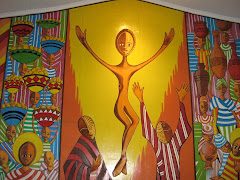


World Social Forum : 2009
Belem City, Brazil
From January 27th to February 1st 2009
Amazon: WSF 2009 protagonist territoryFrom January 27th to February 1st 2009, the city of Belem will host the World Social Forum. During six days, the city assumes the position of being the center of planetary citizenship and a global reference for those who don't agree with inequality, injustice, intolerance, environment destruction and prejudice.Hundreds of self-managed activities – as campings, workshops, seminars, conferences, testimonies, marches, cultural and artistic activities, among others – during this six days will be spaces for exchange, reflection and building of proposals for another possible world.The World Social Forum 2009 territory is composed by the Para Federal University (UFPA) and the Amazon Federal Rural University (UFRA) in a green area along the Guama river facing the rain forest one mile away on the other bank.
Another World is possible! Is it? If so, how?
In Brazil, more than one hundred thousand people are gathering for the ninth World Social Forum. A crowd of some fifty thousand kicked off the event Tuesday with a march through the Amazon city of Belem. The World Social Forum gathers social movements from around the world under the theme of ‘another world is possible.
Another World is possible! Rallying around the call of "Another World Is Possible," the World Social Forum has placed social justice, gender equality, peace, and defense of the environment on the agenda of the world’s peoples. World Social Forums have collectively expanded the democratic spaces of those seeking concrete, progressive alternatives to imperialist globalization.Why Belém, Brazil?The city was chosen to host the 2009 edition of the global forum in order to highlight the importance of the Amazon region for the entire world, and because its local cultural, political and economic reality is strongly linked to many WSF issues, such as bio-diversity, climate change, ethnic and cultural diversity, colonialism, militarism and the various connections between labour and production (from subsistence mineral extraction to hi-tech industry).
''''''''''''''''''''''''''''''''''''''''''''''''''''''''''''''''''''''''''''''''''''''''''''''''''''''
''''''''''''''''''''''''''''''''''''''''''''''''''''''''''''''''''''''''''''''''''''''''''''''''''''''
